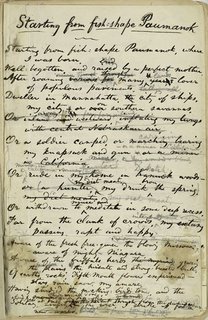I started along this line of thinking when I clicked on one of my favorite browsing sites - the New York Public Library Digital Gallery. This gallery "provides access to over 415,000 images digitized from primary sources and printed rarities in the collections of The New York Public Library, including illuminated manuscripts, historical maps, vintage posters, rare prints and photographs, illustrated books, printed ephemera, and more."
 Today their home page featured digitized images from their collection of Walt Whitman manuscripts. Whitman, with his wandering style and love of rewriting his poems, would make for fascinating study if one could sit down with his manuscripts. But just getting to browse the images provided online is a joy.
Today their home page featured digitized images from their collection of Walt Whitman manuscripts. Whitman, with his wandering style and love of rewriting his poems, would make for fascinating study if one could sit down with his manuscripts. But just getting to browse the images provided online is a joy. Another wonderful site for digitized images of American people, history, cities, landscapes, music, documents, inventions, etc. is the Library of Congress American Memory collection. This eclectic, democratic collection contains many wonderful images from Peoria taken by Works Progress Administration photographers - including many haunting black and white photos of Peoria's famous red-light districts.
One of my favorite images of Peoria comes from the collection of panaromic shots taken in the early twentieth century. This one of Bradley University (then Bradley Polytechnic) seems to capture well what the campus looked like in its earliest days.
 Search for your favorite city, town, state on the LOC site and maybe you'll uncover a treasure, too.
Search for your favorite city, town, state on the LOC site and maybe you'll uncover a treasure, too.I remember hearing too that Google is working with prominent academic libraries to scan their holdings and create a searchable database from that. One trembles to think of the possibilities for literary, geneology, history and many other searches.
For now, libraries and governmental entity sites seem to be a great place to go if you want to stop skimming the surface of the web and start scuba diving!
No comments:
Post a Comment